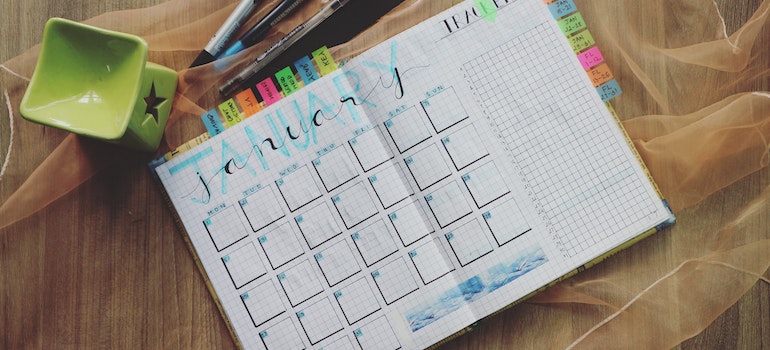‘If you want to change the world, start off by making your bed.’ This famous quote by Admiral William H. McRaven can be applied to all aspects of life. But this becomes even more important when we talk about changing the whole structure of someone’s inner world. When your whole universe is in chaos, incorporating little rules into your life can make a huge difference. We at Harmony Ridge Recovery Center WV always highlight the importance of a structured daily routine in recovery.
Have you fallen out of balance?
The phrase “life balance” is often used in popular culture and literature. This implies that our lives, in general, must have a sense of rhythm, harmony, and order. It’s important to plan out your daily and weekly schedules, including how much time you’ll spend on certain tasks. While you can’t choose when to eat or sleep, you can choose how much time you devote to these activities. Furthermore, you get to decide when and how things will happen. For example, mealtimes often coincide with opportunities to chat with friends.
Once you’ve fallen out of balance, it can be a bit harder to get back on track. By making a plan for how you spend your time, you can ensure that you include all the good, beneficial habits and routines that will aid you in your sobriety. Our experts in the alcohol rehab center in Huntington WV also say that this can help with removing the enormous chunks of “free time” that may tempt you to return to old, destructive behaviors.

Therefore, a structured daily routine in recovery can help you:
- boost confidence
- set up a healthy routine
- find normality
- avoid boredom
- develop discipline
A structured daily routine in recovery – a great way to boost your confidence and emotional well-being
Low self-esteem may both cause and be a symptom of drug abuse. Rehabilitation programs that don’t incorporate counseling to help addicts deal with these underlying problems and learn to relate to themselves in a more constructive way are falling short. Positive habit formation, in conjunction with treatment, is a potent tool for enhancing people’s emotional well-being and boosting their sense of self-worth.
Think about the self-assurance you have when you succeed at something you’ve been working for or when you wake up early to work out. According to the experience of our experts at the alcohol rehab center near Marietta OH, keeping to a routine and racking up a number of little successes along the way may boost confidence and self-efficacy. When you’re experiencing a new degree of vulnerability and giving up drugs that you may have used to conceal or forget self-esteem concerns, these pleasant sensations may be quite helpful.
Your body is made for routine
Maintaining a regular routine has been shown to have positive effects on health. Just establishing a more regular sleep routine may have far-reaching effects on your daytime vitality and general health. Very important parts of your brain, such as the pineal gland, work by circadian and circular rhythm. That means that it has a routine to work on based on the parts of the day, as well as the year.
The pineal gland is extremely important for regeneration during sleep due to its secretions of melatonin. Insomnia is a typical problem, particularly in the first week of recovery. Developing healthy sleep habits during recovery is an effective way to get through the early phase of insomnia and into a regular pattern of deep sleep. Your pineal gland will be thankful and will give back ten times more.

Repetitio mater studiorum est
”Repetition is the mother of learning.” The other parts of your brain and body also benefit from a bit of a routine. The more you repeat some action, the more your brain and body will develop. Your health may benefit from more than just better diet and exercise habits. Substance abuse sufferers at our Ambien rehab in WV often also struggle with diseases like diabetes and high blood pressure.
For them, our experts advise bringing more routine into their lives in terms of eating and exercising. It may help alleviate the symptoms of these diseases by eating well and being active. Also, reversing the aging effects of drugs and alcohol via improved physical health is another way to feel younger and more alive.
A routine may help you find normality
For many individuals with an addiction, taking the first step toward recovery may be a terrifying prospect. Adjusting to a new habit might help you feel more secure and less afraid. When your life has been flipped upside down, or you’re feeling unusually vulnerable, a routine might help you feel more secure.
Making positive changes to your routine might give you the sense that you are gradually exchanging your drug abuse problem for a healthier lifestyle. According to the experience of our experts at benzo addiction treatment in WV, it takes around 66 days for a new habit to become embedded in a person’s daily routine. During the first two months of sobriety, you may discover that your new regimen seems more natural and comfortable.

Avoiding boredom is one of the many benefits of a structured daily routine in recovery
Long-term sobriety is also supported by structure since it helps to reduce boredom, a potential relapse trigger. A lack of direction in life might make a person seek solace in substances like alcohol or drugs. Recovering addicts are particularly vulnerable to the perils that might arise when they are given too much free time and too little structure.
It is particularly important to set a plan that will help you avoid extended periods of nothing to do if you have used narcotics in the past to battle boredom. An effective plan for sobriety would include both positive routines, like therapy sessions, and enjoyable pursuits, like hobbies. Keeping yourself occupied is a great strategy to better your life in many ways and to prevent returning to old, destructive habits.
The development of discipline is important in the recovery
Successfully overcoming addiction requires more than just determination. Substance abuse is a medical condition that has to be addressed in a comprehensive way. After you’ve gotten through the first challenges of addiction recovery, self-discipline will be crucial to your ongoing success. Discipline may help you avoid giving in to temptation when it arises. That is one of the reasons why a structured daily routine in recovery is crucial.
You can’t just summon up some self-control whenever you need it. Psychologists argue that it’s more akin to a muscle that can be trained. Recovering addicts might take heart from this news since it implies that they can strengthen their willpower in preparation for future challenges. You can better prepare yourself to avoid the desire to take drugs or alcohol if you can resist the need to do things like remain in bed too late or eat an unhealthy snack late at night.

What are some of the best routines to develop and why?
Although you can use any kind of routine as a starting point, some of them have more benefits than others. The most beneficial routines you can establish when in recovery are:
- going to group therapy regularly
- eating healthy
- setting a regular sleep schedule
- meditating
- exercising
- cleaning your living space
Don’t miss your group therapy session
Regular participation in a support group or recovery meeting is an excellent method to kick unhealthy habits to the curb. Going to the same meetings every day or week not only helps you develop structure but also gives the other members a chance to get to know you. Due to the familiarity, you will feel more accountable, which in turn will increase your drive to maintain your sobriety.
People in early sobriety should focus on establishing a consistent, healthful regimen. For a lot of our patients at the alcohol rehab center near Cambridge OH, attending group therapy sessions regularly helped a lot with their after-treatment care. It may help you feel less overwhelmed, accomplish more, control your appetite, connect with others, and avoid feeling alone.

Your body is your temple – give it proper building blocks
Addiction destroys everything in its way, and your body is not an exception to this rule. Everything is imbalanced, especially nutrition. When you’re not eating regularly or you’re not eating properly, it becomes even harder to battle this vicious disease. This is logical – you need fuel to participate in this important battle.
For someone who’s not struggling with addiction or eating disorders caused by it, this step of a structured daily routine may seem too simple to even be on this list. However, for those in struggle, this ”simple” step can make the whole difference. So, even if you don’t feel like eating, put effort into not skipping breakfast, then lunch, and dinner. Patients in cocaine addiction rehab have shown major improvements once they’ve established a healthy and balanced diet.
Set a regular bedtime routine
As we’ve mentioned before, substance abuse and insomnia are linked, and those who have trouble sleeping are more likely to relapse. Difficulties falling asleep and staying asleep are typical in early recovery, particularly for those suffering withdrawal symptoms.
Getting back into your body’s normal and healthy sleep cycle is as simple as establishing and sticking to a regular sleep pattern that includes going to bed and getting up at the same time each day, including on weekends and days off. Over time, you’ll find it a lot easier to go to sleep and remain asleep, and you’ll probably experience less tension and irritability throughout the day.
Start your day with zen
As part of a regular routine, meditation may be a useful method for dealing with the stresses associated with the healing process. Nonetheless, it might be challenging for those fresh from detox to keep their minds clear and focused. As luck would have it, you don’t have to be a Zen master to reap the benefits of meditation.
In fact, our experts at the alcohol rehab center near Athens OH suggest that even novice meditators saw improvements in anxiety and focus after just eight weeks of regular practice. Don’t stress out about how well you’ll meditate; just decide to give it a go. Daily peaceful meditation, even for only 10 minutes, has been shown to improve mood, reduce anxiety, and speed up recovery.

Get active
Exercising at least three times a week is something that all of us should do, but not many do it. However, making the exercise of your choice a crucial part of your schedule and sticking to it can help you a lot through recovery. Also, the levels of dopamine and other hormones of happiness will lessen your desire to substitute them with drugs or alcohol, as you’ll experience natural levels of ”high”.
Clean your living space
As we’ve mentioned at the beginning of this article, in order to change the world, you first need to make your bed. Starting your day by making your bed, you’ll already feel like you’ve accomplished something. This will help you motivate to get a grip on all the other challenges that day brings ahead of you. The same goes for cleaning – once you’ve done and once you see the absence of chaos in your room, you’ll see less chaos in your head too.
Structured daily routine in recovery can save your life
All of these things that we mentioned as a part of a structured daily routine in recovery may seem simple enough. However, for people in rehabilitation, and way after they finish it, a fixed routine is something that can save their lives. It’s easy to trip on your way to harmonious life, but with a firm structure to hold you above the abyss, it will be easier to avoid all traps and arrive at the wanted destination.
References:
https://www.gatewayfoundation.org/addiction-blog/benefits-exercise-for-recovery/
https://www.ut.edu/uploadedFiles/Academics/Acta_Spartae/AS_0501p1Colaianni.pdf
https://store.samhsa.gov/sites/default/files/SAMHSA_Digital_Download/pep20-02-01-020.pdf



